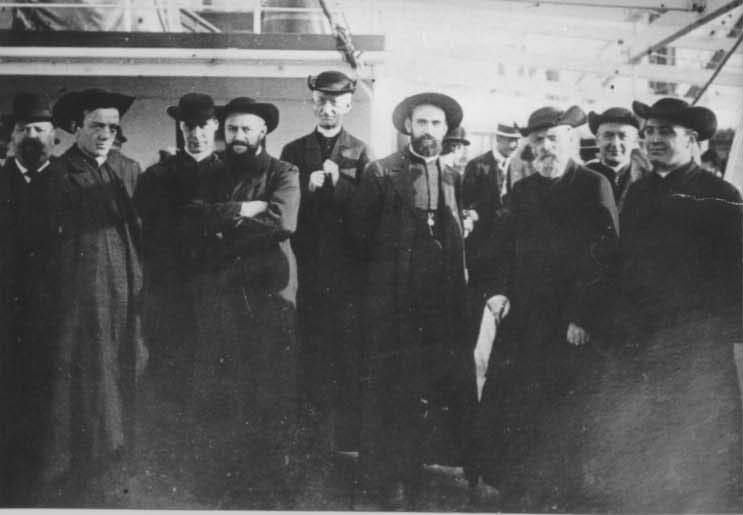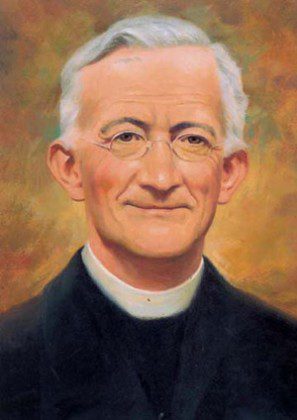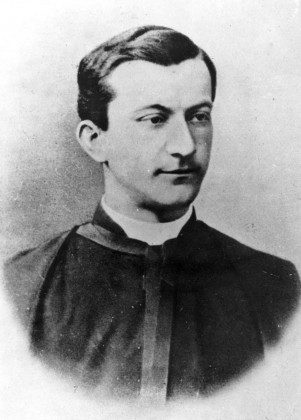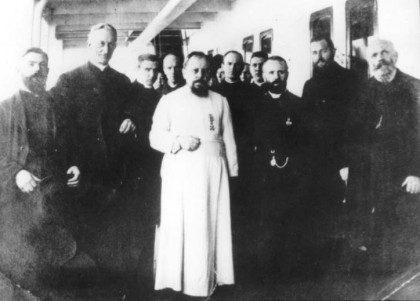
Fr. Leo John Dehon: remembering the founder on the anniversary of his death
“For him I lived, for him I die. He is my everything, my life, my death and my eternity,” said Fr. Leo John Dehon, pointing at a portrait of the Sacred Heart just moments before his death on August 12, 1925.
Fr. Dehon was the founder of the Priests of the Sacred Heart, a religious community of brothers and priests now located in over 40 countries on five continents.
At Fr. Dehon’s funeral, Bishop Binet eulogized the founder as a citizen and priest, saying “What a prominent place this city of St. Quentin had in the life of the octogenarian, of the great French citizen, of the excellent priest whom we mourn! He came from La Capelle with a vast accumulation of knowledge seldom found in a young priest. But like all good priests, he did not shut himself up in the ivory tower of his intellectual superiority, but threw himself wholeheartedly into work, especially among laborers.”
An inspiring journey to religious life

When Leo Dehon was a sophomore in high school, attending midnight Mass on Christmas Eve, he felt an intense urge to give himself to God as a priest and to bring others closer to God. The turmoil of his high school years did not dispel this feeling, and he decided to enroll in a seminary upon graduation.
But Leo’s father had other ambitions for his youngest son. The Dehons were prosperous landowners whose holdings included rich farmland, prized livestock and thoroughbred race horses. The elder Dehon envisioned a career for his son in business, law or politics and insisted that Leo pursue a fitting education.
In 1859, Leo went to Paris, where he earned a bachelor’s degree in science and then studied law. He explored the city’s culture and arts and was active in his parish, where he attended daily Mass, taught religion to neighborhood children and, as a member of the St. Vincent de Paul Society, visited the poor and elderly. After five years of exciting city life, Leo’s dream of being a priest was still very much alive.
His father, however, insisted Leo take another direction. He arranged for Leo and his college roommate to go on a nine-month tour through Greece and the Middle East. For two young men in their early 20s, this proved to be the adventure of a lifetime. Bandits shot at them as they rode horseback through the Balkan mountains; all their clothes became infested with lice in Egypt and had to be burned; they sailed on a barge down the Nile and rode camels across the Sinai desert.
But the trip also had a spiritual dimension. They spent two weeks in the Holy Land, where Leo followed in the footsteps of Jesus. And returning home by way of Rome, Leo had an audience with the pope, who affirmed him in his vocation.
Finally, Leo’s father relented, and in October Leo entered the French Seminary in Rome. He would always call these his “golden years.” He excelled in his theological studies and also learned to meditate, a method of interior prayer that for the rest of his life would connect him to the living love of the Heart of Jesus. Leo became convinced that sharing this love should be the foundation of his life and could be the remedy for much of the world’s disorder and misery.
His ordination to the priesthood was the fulfillment of a dream, with the additional joy of giving Communion to his father, who had returned to the faith. Leo’s ordination also marked the beginning of a mission to help others know God’s love.

Armed with three more degrees – in philosophy, theology, and church law – Father Dehon returned to his home diocese. His bishop, surprisingly, assigned him to a large urban parish in the blue-collar town of Saint-Quentin. Most of its 35,000 people were barely able to earn their daily bread. The majority were nominally Catholic, but few went to church. Father Dehon saw that the Church’s pastoral methods were out of sync with the times. He knew it was not enough to simply celebrate Mass and administer the sacraments; the priest had to go to the people.
He began by organizing a youth group, which grew over a few years to more than 400 members. At St. Joseph’s Youth Club, the 13- to 17-year-olds could play games and participate in sports; borrow books and magazines from the library; learn about money management at the savings bank; and take remedial and supplementary classes. Always, Leo Dehon was a kind, fatherly presence who consoled, cajoled, encouraged and inspired.
Next he turned his attention to the 18- to 25-year-olds just entering the work world, offering them a safe haven from bars and street life. He taught them about their rights as workers, encouraged them to save and instructed them in the ideals of Christian marriage. He also kept business and civic leaders informed of these good works, soliciting their continued support.
At 33, Father Dehon found life smiling on him: his ministries were a success, he was esteemed by his bishop and he was welcomed throughout the city. But he was not happy. The “busy-ness” of his public works left little time to deepen his personal relationship with the Lord. He considered joining a religious order but realized there was no one to carry on his ministries.
His sympathetic bishop proposed a solution: Father Dehon could establish his own religious congregation if he would also establish a Catholic high school in the city. The bishop would get his high school, Father Dehon would be able to live as a religious and the new congregation would care for the ministries he had established.
In July 1877, Father Dehon started the high school and began a year of intense preparation for his new religious congregation. The following June he made his first vows. His congregation, modeled after the love of the Heart of Jesus, became the new means for Father Dehon to realize his dream of uniting himself to the love of God while sharing that love with others.

